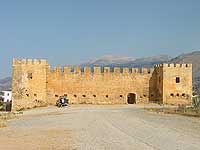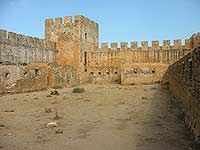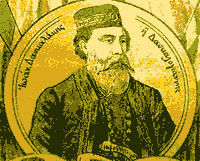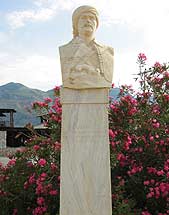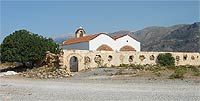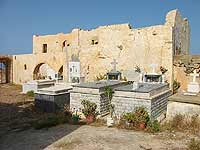| The
castle is situated towards the sea on the plain, which stretches out from
Sfakia to the east and which in wintertime is used by the shepherds from
the mountains. It is the only remaining Venetian castle that is still
intact - at least the exterior. It was built in 1371 by order of the
senate in Venice and measures 60 m by X 30. The four corners are each
provided with a tower, a little higher and broader than the walls. Above
the entrance is a relief of the Venetian St. Marcus lion and three
Venetian shields. The inside buildings are of Turkish origin. 500 m east
of the castle are the ruins of the Agios Charalambos monastery with an
Agios Nikitas church from the 14th century.
|
|
|||
| By
building the castle the Venetians were able to control the coast and defend
themselves against attacks from pirates, and not least against the repeated
attacks from the inhabitants of Sfakia. These attacks started as early as in
1319 after the event with the Gold-Haired.
The story is as follows:
|
||||
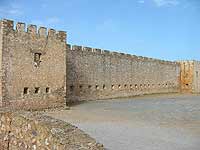
|
One
day the leader of the Venetian castle in Sfakia, prince Capuletto, met the
beautiful Chrysi Skordili, the daughter of a rich man. He was moved by her
beauty to such an extent that he immediately kissed her on her mouth. Her
prompt reaction to the Venetian's act of love was to slap his face so hard,
that she almost blinded him. Also her two servant girls tore him apart. Out
of his mind with anger he drew his sword, cut off Chrisy´s hair and hurried
back towards the castle.
|
|||
| When
Chrysi's father heard what had happened, he flew into a fury, ran down
Capuletto and butchered him in the most violent way. In the meantime other
members of the Skordili family had also arrived in order to help, and they
attacked the castle, killed many of the Venetians and tore down to the
ground big parts of the castle.
|
||||
| Of
course the Venetians sent large military forces to the area in order to
defeat the violent rebellion, which was brought to an end through mediation
by Alexios Kallergis.
|
|
|||
| During the building of the Frankokastello castle, the sfakiotes, led by six brothers from the Patsos family, performed daily attacks on it and at night they tore down, what was built during the day. Once again the Venetians sent large military forces to the area, and at long last they succeeded in finishing the castle. After this they wanted to punish the sfakiotes and first of all the six brothers, who were captured after treachery by a man from Asi Gonia. The six brothers were hanged, four from the towers of the castle and two above the entrance door. This humiliating death caused the sfakiotes to attack the castle again, while the proud people from Asi Gonia captured the traitor and killed him under the eyes of the sfakiotes. | ||||
|
|
||||
| Daskalogiannis |
|
|||
| When
the Turks captured Crete in the middle of the 17th century, they also
occupied the castle, and it was in fact here that the first rebel leader
Daskalogiannis
had to surrender to the new occupying power together with his
70 men in 1771. Barba-Pantzelios, a poor cheese-maker from Mouri north of
Sfakia, tells in his song To tragoudi
tou Daskalogianni from 1786 (verse 683 ff.) about the course:
|
||||
|
Daskalogiannis |
||||
